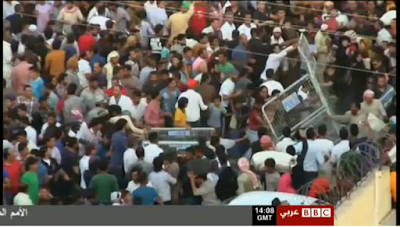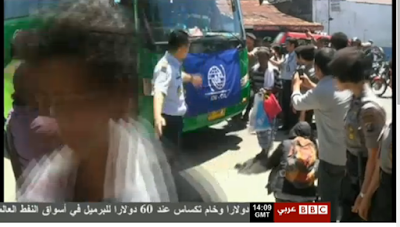First, they showed these pictures of Syrian refugees who I think were rushing over a fence on the Turkish border. The pictures are entitled: 'What more can be said?'
You can see in the next picture how the 'polis' fence gets knocked down.
They focused on Arab refugees, but they also talked about people fleeing in South Sudan:
And they talked about the persecuted Rohingya minority in Burma:
Then they started debating. This man was corresponding via video. He said: Europe is lying when it says it wants to help the refugees. Instead of helping, they are actually engaged in military operations in all these suffering countries.
This lady, though, put more of the blame on the Arab countries. She said: all these governments are just going to war and they are awfully corrupt.
The anchor probed her further. He said: Why is it always the West that is blamed? We always seem to blame others. What about our role in the problem?
That's exactly what I was saying, the lady said. But you know, we should also keep in mind that this world has a minority (the West) that has a lot and a majority (everyone else) who has very little.
There was another man in the studio with a bright blue tie:
He said: now that there's internet, Arabs see how other people live. They see the difference, so they want to go to these more modern places.
But, he added, the very dangerous boats that people are crossing the Mediterranean on, the ones that kill so many people - people never took that risk just because they wanted a more western life. They are taking that risk now because there are so many wars and people are desperate. Before all these crises, the people who just were seeking a better life did not take that route.
Then, it was the turn of the man on the video link-up again. He said: Well, it's the West's fault. They act like they are martyrs to all the illegal immigrants, but really, they deal with it in a military way rather than trying to help the people. The EU says it wants to defeat terrorism with their military operations; but they won't help countries like Nigeria and Chad that are suffering from the most of it.
So the BBC Arabic anchor put forth the question: Well, don't you think the EU wants to help, but they know those governments are corrupt and that the money won't go anywhere?
This made the man on the video very mad.
He said: Actually, the UN has said that they will take care of the money transfers, so there's no need to be worried. And also, what about all the refugees arriving in Bulgaria and Italy. Why won't the EU help them?
Then he got even more mad:
And he continued: plus, the total number of refugees in Europe has not reached 100,000 yet (either I misunderstood him, or he was making that number up. I think there's 80,000 Syrians in Sweden alone) and meanwhile, Jordan and Lebanon have millions of refugees each, and they're both poor countries.
Plus, the man on the video added, there's 4 million Syrian refugees total and the EU now says that they'll take 40,000 of them, and that's just not good enough. And the UN is taking care of a lot of people, but no one helps it.
Then it was the turn of the man in the bright blue tie again. He said: What about the supposedly Muslim countries of the Gulf. They haven't taken even one Syrian refugee. (That actually is not true, either. The bloated, baggy-eyed 60-year-old men of the Arabian Gulf have actually taken quite a few Syrian refugees - the 13-year-old girls that they are marrying.)
The BBC Arabic anchor was quite intrigued on this point. He asked: do the Arabic Gulf countries just hate the Syrians, what's going on?
I didn't catch exactly how the man in the blue tie answered him, but it might have been in the affirmative, because he tacked on to the end: there's always been Syrian laborers working in the Arabian Gulf, from even before the war starting. But those laborers aren't even allowed to bring their families over.
Then, the man in the bright blue tie started piling it on:
He said that in Turkey and Lebanon (and maybe Jordan, I'm not sure), they don't even refer to the Syrian refugees as 'refugees'. That's a problem, because designating someone has a 'refugee' comes with certain obligations of having to take care of them and help them. But Turkey and Lebanon just call the Syrians 'guests' or 'displaced people', so they really have no permanent rights. If a new government comes into power in Turkey and has new politics, they can choose to kick all their 'guests' out, because they never labeled them officially as refugees.
Meanwhile, the man on the video link up sat with his head cast down as he listened to bad Muslims who won't treat their fellow Muslim refugees properly:
The lady in the black and white dress added a word about Iraq. She mentioned how in Iraq, the Iraqi citizens of Anbar have been blocked from fleeing to other parts of the country at the very moment when Daa-esh (ISIS) was taking over their towns. So actually the movement of the refugees was restricted inside of the country. And she added that for those who are internally displaced in Syria, they face the same problems that different sects will bar each other from coming into their territories.
And then the lady reminded everyone that 'really, Africa is the forgotten continent'. Apparently, five of the countries with the most refugees are in Africa, and there's no plan and no help for them.
The man in the bright blue tie came back in: It's not just the right-wing parties in the EU who are against helping refugees, but actually, there's really bad movements against refugees in Lebanon, Jordan, and Egypt. And for example, Jordan still has not provided electricity for its largest refugee camp, the one in Zaatari.
Well, the BBC Arabic anchor challenged him, you know that Jordan is a very poor country.
Sure, said the man in the bright blue tie. But so is Lebanon, and Jordan has fewer refugees than Lebanon. Not to mention that the refugees in Lebanon and Jordan are not even going to school. We must do something so that going forwards, this crisis does not explode into the future.
And the lady in the black and white dress had more stories about bad treatment: It's true that Turkey has taken in lots of refugees, but two months ago they shut the borders and the police were very brutal to those who ended up coming illegally, anyways.
Looks like the man on the video link-up was too embarrassed to say any more. Naw, it was just that he couldn't stay any longer - his spot on the TV is empty!
A refugee is a refugee, the two guests remaining explained: you're not allowed to stop them from coming, like what was done in Iraq with those fleeing from Daa-esh.
Now it was coming towards the end, and they were very despairing at this point, so the question was: Why does all this happen in the Middle East?
Well, said the lady in the black and white dress, because there's no justice in the whole region. It's all corruption, governments don't care. Add to that the religious and political conflicts and there you go.
If that's the case, the BBC Arabic anchor asked her, why should anyone else care?
Because, the lady said, we are all partners on this planet. It's just like with global warming. What affects one affects all. What happens in the Middle East will affect everyone.
And the man in the bright blue tie closed the conversation by saying: if we'd given a strong role to the UN at the very beginning to forge a solution, then we wouldn't have reached this point of four million Syrian refugees.

















No comments:
Post a Comment